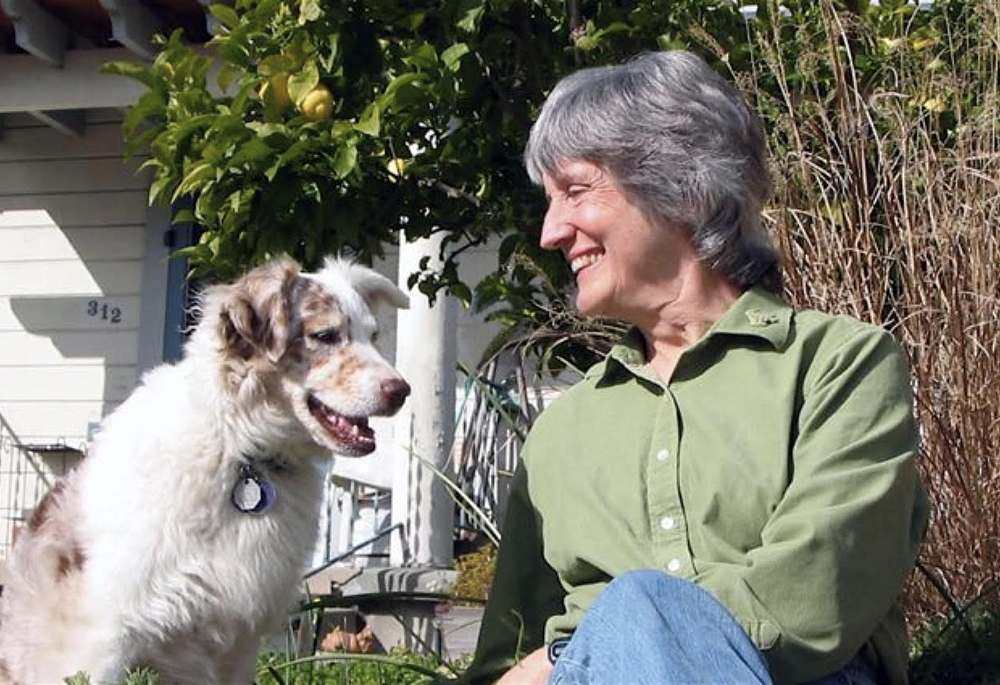
Donna Haraway and her dog, Cayenne, are pictured at home in 2007. The phrase "contact zone," cited by Pope Francis in Laudate Deum, is from a chapter in Haraway's 2008 book When Species Meet that explores their experience training Cayenne in agility, a sport where a dog and a human handler navigate an obstacle course. (Rusten Hogness)
Donna Haraway woke up in California on the morning of Oct. 4 to a deluge of emails from her friends. Nine hours behind Vatican City, where Pope Francis' new apostolic exhortation had been released at noon that day, Haraway learned she'd been cited in a footnote of Laudate Deum.
"God has united us to all his creatures. Nonetheless, the technocratic paradigm can isolate us from the world that surrounds us and deceive us by making us forget that the entire world is a 'contact zone,' " wrote Francis, citing Haraway's work about multispecies unity.
"Some baby Jesuit who's into animal studies and science studies and feminist theory for some weird reason has been reading me," Haraway told EarthBeat, alluding to presumed ghost writers behind the apostolic exhortation.
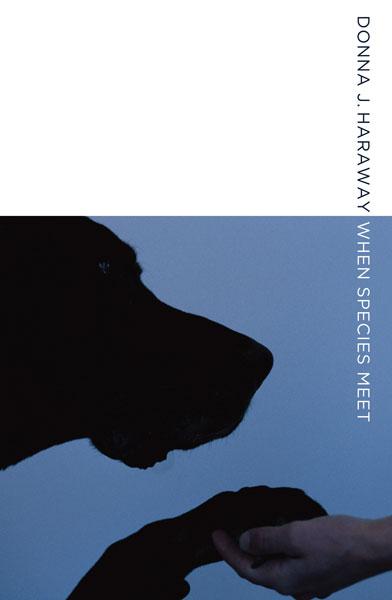
Pope Francis cites a chapter from Donna Haraway's 2008 book When Species Meet in his apostolic exhortation Laudate Deum, released Oct. 4. (University of Minnesota Press)
Haraway is a distinguished professor emerita at the University of California, Santa Cruz, with connections to its departments of feminist studies, anthropology, environmental studies and history of consciousness.
She is best known for her work that explores humanity's relationship with animals and machines — like "A Cyborg Manifesto" from 1985. Hari Kunzru wrote in a 1997 Wired profile, "To boho twentysomethings, her name has the kind of cachet usually reserved for techno acts or new phenethylamines."
The phrase cited by Francis is from a chapter in Haraway's 2008 book When Species Meet that explores Haraway's experience training her dog, Cayenne, in agility, a sport where a dog and a human handler navigate an obstacle course.
In the chapter, Haraway elaborates on Mary Louise Pratt's term, "contact zones," where Pratt wrote that "cultures meet, clash, and grapple with each other, often in contexts of highly asymmetrical relations of power, such as colonialism, slavery, or their aftermaths."
"Contact zones are fraught with danger, with the practices of encounter and conquest, but they are also places of possibility, places where peace might be made," Haraway told EarthBeat.
"A contact zone is a place of 'working with' to achieve something," Haraway said.

Donna Haraway's dog, Cayenne, jumps during an agility match in 2006. In the context of agility training, a "contact zone" is a place where a dog's paws must touch on the equipment, said Haraway. (Richard Todd)
Haraway extends the term to multispecies encounters. In the context of agility training, a "contact zone" is a place where a dog's paws must touch on the equipment.
"It just totally cracked me up because I've written about the questions of multispecies bonding and the scandal of human exceptionalism in many places," said Haraway. "Maybe that imaginary baby Jesuit plays agility with his dogs."
The vast majority of citations in papal documents are of men, so Haraway's gender was one source of surprise to observers when they found the citation.
Haraway uses both she and they pronouns, explaining, "the ongoing persecution and oppression of genderqueer people in the church and elsewhere is part of the reason that I use pronouns like that. It's a statement of alliance." They added, "My own corporeal and social formation is pretty cisgender."
'Some baby Jesuit who's into animal studies and science studies and feminist theory for some weird reason has been reading me.'
—Donna Haraway
As recently as March, Cardinal Robert McElroy, a prominent American papal ally, said that it would be "jarring" to classify Francis as a feminist. Yet, Haraway said, "there are lots of ways in which feminism is nibbling at the edges," pointing to the participation of women as voting members in the current Synod of Bishops as an example.
But Haraway's gender wasn't the only reason their citation provoked all-caps reactions on social media.
Haraway has been open about her disapproval of the Catholic Church. "I've been in deep apostasy for decades," Haraway said. "I know the teachings of the church very well because I was a very, very serious Catholic."
"They must have known that I had never disavowed my Catholic formation," she said.
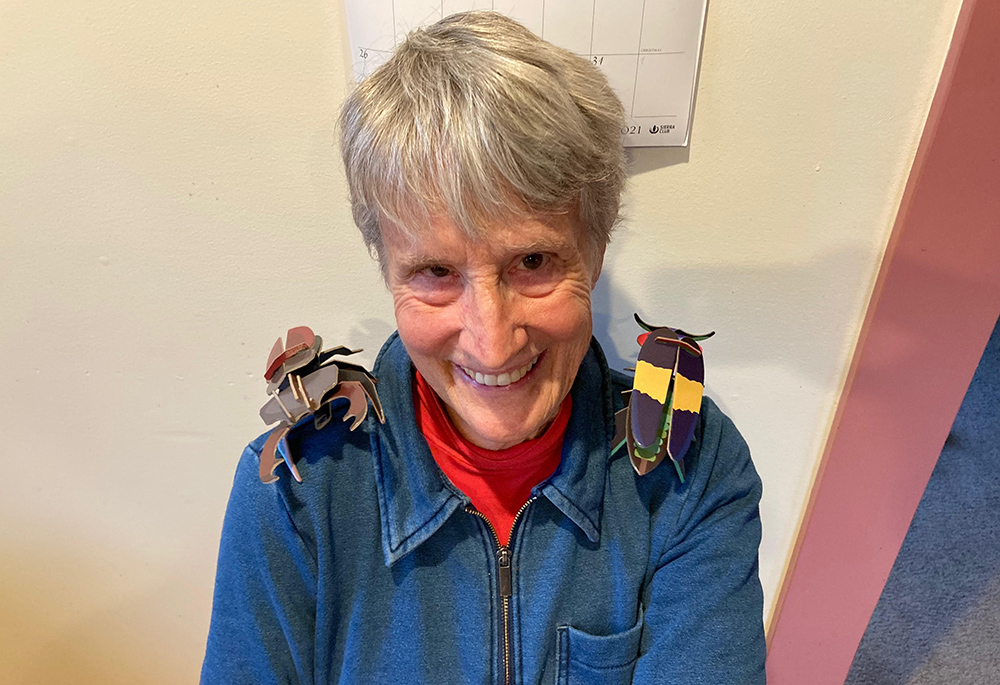
Donna Haraway is a distinguished professor emerita at the University of California, Santa Cruz, with connections to its departments of feminist studies, anthropology, environmental studies and history of consciousness. (Courtesy of Donna Haraway)
As a child, Haraway recalled, "I said Mass for my dolls on my dresser. I heard their confessions in my closet, and I was a feminist because I knew the priesthood was barred to women."
For Haraway, "the patriarchal and totalitarian nature of its structures, the anti-feminism and misogyny" became "insupportable" in her 20s, and, "for all his intentions," they still see these elements in Francis' papacy.
"My sense that it was morally insupportable and wrong to remain within the church preceded loss of belief," said Haraway.
"Belief is a question of practice, not a question of abstract doxa," Haraway said. What holds the body of Christ together is "practice, and it's sacramentalism, it's ritual, it's community," they said.
"When you cut yourself off from that, it becomes more and more distant, but the parts that I never cut myself off from had to do with the preference for the poor," she said.
Advertisement
In an essay released this February about her late friend French philosopher and anthropologist Bruno Latour, Haraway spoke of the concept of the "real presence" — in Catholicism, an affirmation of Jesus' presence in the Eucharist — as guiding her understanding of semiotics, or the study of signs and symbols.
"Real presence means that meaning and flesh, bodies, the earth are not separate but inextricably conjoined in living and dying with each other," Haraway told EarthBeat. "That sense of being in and of and with the world in its fleshliness, I think I inherited from my formation."
For Haraway, "Laudato Si', on Care for Our Common Home," Francis' 2015 encyclical, "struck a deep chord." She said, "I felt the language, the tone, the call very profoundly."
In her essay about Latour, Haraway wrote, "this encyclical is a long naked sermon; it is a passionate, yearning, reasoned, social and natural science-filled mobilization of words and speech."
Haraway said that Laudato Si' was "truly religious speech," referring to a concept from Latour's 2010 book On the Modern Cult of the Factish Gods. "In Factish Gods Bruno analogizes religious speech to the speech acts of lovers. The task is to make acts of love to be alive and present, not as memories of past love, but as vitalizing loving now and here," she wrote.
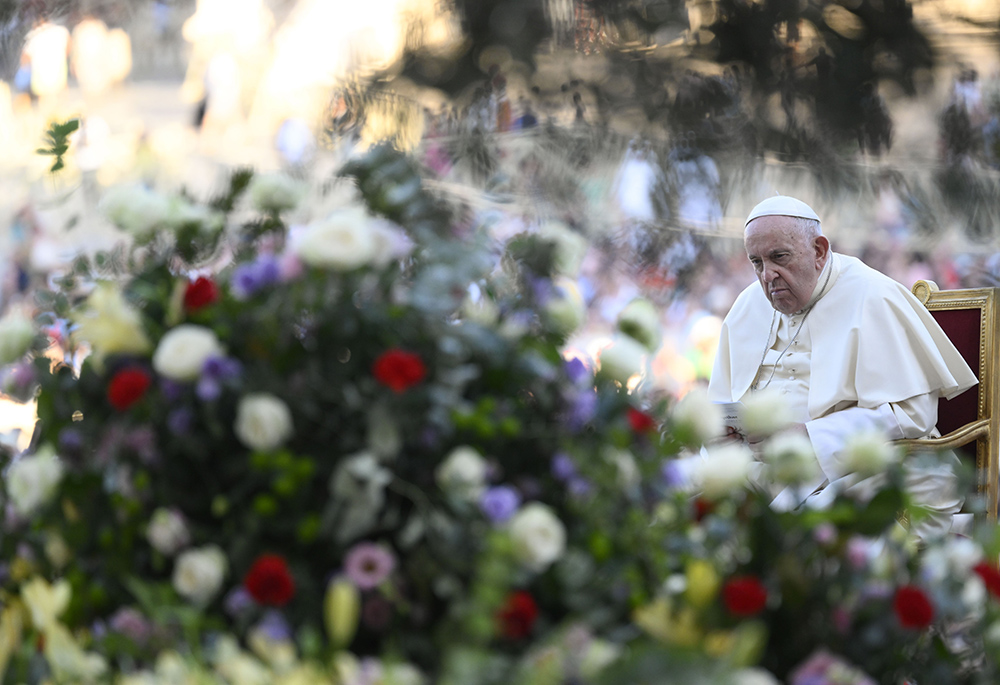
Pope Francis listens during an ecumenical prayer vigil before the assembly of the Synod of Bishops in St. Peter's Square, Sept. 30 at the Vatican. (CNS/Vatican Media)
Laudato Si' was "a call to presence" and a call to be "present to suffering and to be present to the obligations of response," Haraway told EarthBeat.
While Haraway called Laudato Si' "brave and powerful," they said that Laudate Deum comparatively lacks an "emotional power," partially because of its strong focus on the upcoming United Nations climate summit, COP28.
"I have a list of what pissed me off," Haraway told EarthBeat of other aspects of the letter.
Francis wrote, "In an attempt to simplify reality, there are those who would place responsibility on the poor, since they have many children, and even attempt to resolve the problem by mutilating women in less developed countries. As usual, it would seem that everything is the fault of the poor."
Haraway said that, while Francis was correct to call out those who place the blame for climate change on the poor, he failed to adequately deal with the complexity of the population issue.
"In my lifetime and in Francis' lifetime, the human population has moved from about two and a half billion to well over eight billion," Haraway said. To reduce the population issue to emissions and "to say that this is a non-issue when you're addressing climate change is a scandal."
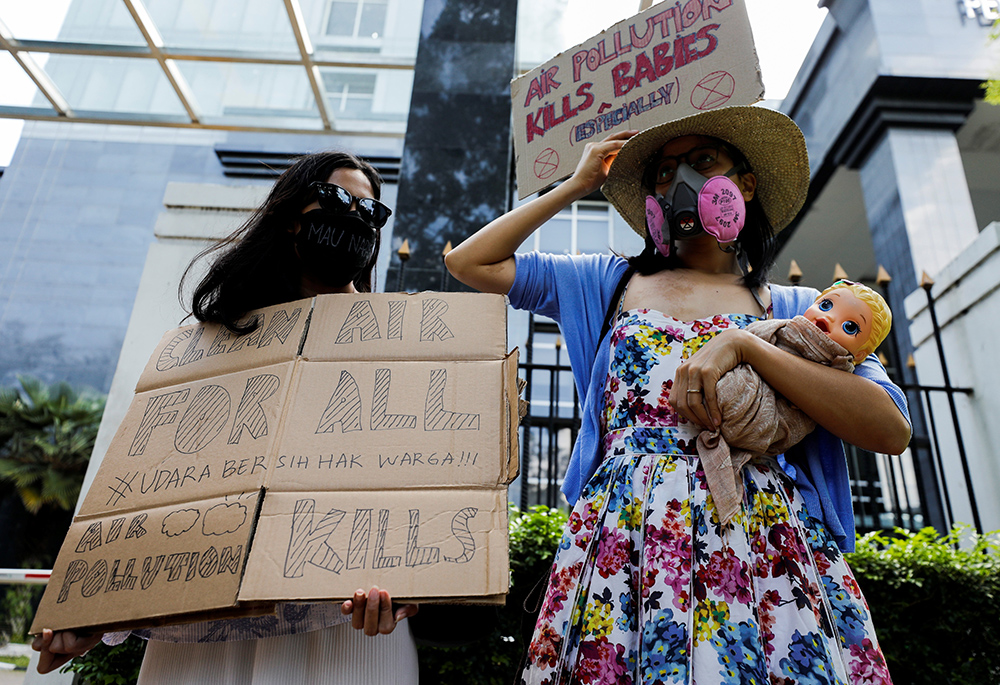
Environmental activists wearing protective masks hold placards outside the central court in Jakarta, Indonesia, Sept. 16, 2021, after citizens sued the government for the city's chronic levels of air pollution. Donna Haraway said that the Vatican does not talk enough about the devastating climate and environmental impacts on the unborn. (CNS/Reuters/Willy Kurniawan)
"I think he brought it up because he is still consumed by the supposedly pro-life positions of the church and the opposition to both birth control and abortion that remains strong," Haraway said.
"The complexity was just smashed by [that] ideological commitment," they said.
Drawing on the analysis of her friend, biologist Scott Gilbert, Haraway said that the Vatican does not talk enough about the devastating climate and environmental impacts on the unborn.
"This letter is totally oriented toward governments" and gives only "a nod" to the importance of activism, said Haraway.
"If you're really serious about the unborn, why aren't you calling for all of us in our multi-thousands to be blocking the entrances to corporate headquarters, to be blocking the entrances to fossil fuel plants, to be arguing against industrial agriculture?" Haraway asked.
Haraway's other point of contention with Laudate Deum is its use of the term "technocratic paradigm," rather than "technocratic capitalism." Francis uses the phrase to criticize the idea of technology and economic growth as unquestioned goods.

Students take photographs of mushrooms April 29, 2019, in Cota Cota, La Paz, Bolivia. (CNS/Reuters/David Mercado)
But Haraway said that framing "the enlisting of technological expertise and technological talent in the ongoing bleeding dry of the earth for profit" as a "technocratic paradigm" related to a human quest for limitlessness "is frankly bullshit."
"It's not humanity as such. It's very situated formations of nations and peoples and businesses," said Haraway, saying Francis was "misidentifying the problem in terms of something in human nature."
Based on the volume of email she received so quickly after Laudate Deum's release, Haraway said she was surprised by how many of her colleagues, including those without any Catholic background, had been eagerly waiting for Laudate Deum.
Her non-Catholic colleagues told her, "Maybe there is a chance that this papacy can be a force for peace and a force for addressing the multiple urgencies: the migration problems, the extinction crisis, the questions of climate destruction."
Despite that hope for what the pope could accomplish, and despite her own citation in a papal letter, Haraway said, "Nobody has any hope on the issues of misogyny."








